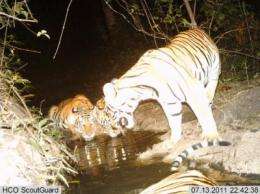Candid video clips from Thailand show anti-poaching efforts saving wildlife

Incredible camera trap video footage from the forests of Thailand have given conservationists confirmation that anti-poaching efforts in that country are paying off, according to the Wildlife Conservation Society.
The footage—taken by camera traps from several locations across Thailand's Western Forest Complex over the last year—has revealed a cornucopia of rare glimpses into the lives of tigers, Asian elephants, gaurs, sun bears, and many other species. The clips show a tigress and her cubs feeding on an animal carcass, leopards marking their territory with scent, wild pigs nursing their young, even Asian elephants mating.
"The video represents a huge payoff for the government of Thailand, which has invested considerable resources in protecting wildlife and preventing illegal hunters from plundering the country's natural heritage," said Joe Walston, Director of the Wildlife Conservation Society's Asia Program. "We thank the government of Thailand for collaborating with WCS and others to put in place best practices in law enforcement and monitoring tigers and prey in Western Forest Complex."

In particular, the camera trap footage shows that tiger and prey populations have stabilized in the large core area of the Western Forest Complex, an area measuring some 18,000-square kilometers (larger than the state of Connecticut) and comprising 17 contiguous protected areas. According to recent estimates, the region is home to 125-175 tigers. The complex also contains one of the largest and most important elephant populations in Southeast Asia. In addition, the video clips detected the presence of especially rare and elusive species, including clouded leopards, banteng (a wild cattle species), and many others.
The sheer quantity of footage and diversity of species highlights Thailand's pre-eminence as a leader in conservation and enforcement, boasting what is considered one of the best anti-poaching forces in all of Asia. Every year, WCS works in collaboration with the Thai government to train and equip several hundred park rangers who patrol and protect the region's wildlife. This investment is not only paying off in terms of biodiversity, but also in the capture of poachers.

Earlier this year, WCS helped train and equip park rangers who captured poachers possessing a cell phone that contained images of a dead tiger. When the poachers insisted the tiger was killed in another country, WCS used camera trap identification software and records to identify the tiger as a resident of Thailand's forests. The evidence was used to refute the false testimony and arrest the poachers.
Thailand serves as a training ground for guards from other Asian countries seeking to protect their own resources. WCS collaborates with the Thailand government in the training of enforcement staff from China, Nepal, India, Myanmar, Bhutan, Cambodia, Laos, Malaysia, and Indonesia.
Provided by Wildlife Conservation Society

















